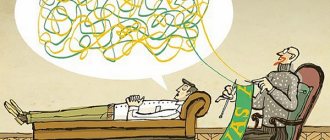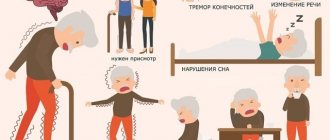Depression is a condition that can be caused by somatic or nervous disorders, or be a consequence of stress, family troubles, or other problems in personal or social life. It can also develop absolutely without any external reasons, against the background of complete well-being - in this case, the cause, as a rule, is a violation of the level of neurotransmitters in the brain.
To receive quality treatment, the patient must realize that bad moods can occur in absolutely healthy people. While with depression, low mood or depression lasts for at least two weeks and may be accompanied by sleep disturbances, appetite, decreased performance and other symptoms, which we will discuss later.
Depression can occur in people of any age, regardless of gender. The death of a close friend, relative, loved one or child can be a catalyst for progressive feelings of sadness. Sometimes the only beloved child, unexpectedly for those around him, becomes unsociable and withdrawn. We need to try to figure out the reasons as quickly as possible and help him gain faith in himself. A simple misunderstanding among classmates and friends or the appearance of another child in the family can disrupt the psychological balance and become the root cause of depression.
How depression manifests itself
The main manifestation of depression is a persistent decrease in mood, the cause of which most often cannot be explained. The depressed mood itself is different from the grief that you experience during various misfortunes. A person suffering from depression usually cannot formulate his experiences due to the unusualness of the sensations, their difference from everything that he had previously experienced in life. Such people often resort to comparisons: “there is heaviness, stone, darkness in my soul”, “everything has lost its meaning, joy”, “life has become difficult”, “I feel as if I had a super-severe flu.”
What are the causes of depression?
The cause of depression is inherited biochemical disorders at the level of the central nervous system. And also certain personality types: hypersensitive, scrupulous, pedantic, overly sensitive to failures, impressionable, vulnerable people are more susceptible to depression than others. We can talk about a risk group for depression: women suffer from depression much more often than men. If we talk about age, the lower limit for this group is 18-20 years old, the upper limit is 35-40. There is also a special form of depression that begins during menopause.
From Castro to Mikoyan
Take Castro's classic The Geography of Famine (1954). Not a bearded man from Cuba, but a Brazilian scientist.
Josue de Castro headed the Brazilian Food Department and was chairman of the Food and Agriculture Organization (FAO) of the UN. He wrote articles and books on hunger and nutrition issues for decades. That is, he knew the topic, probably, like no one else on the planet.
In the bread line, San Francisco, 1932
In 1954, “The Geography of Famine” was officially translated into Russian - both from the publication in Boston and from the French version in Paris, for good measure. Even earlier, in 1953, the book was highly praised in Pravda. Because “the rottenness of the outdated capitalist system has never been as obvious as it is now” - from the preface. The author, of course, “is not a supporter of historical materialism,” but he exposed imperialism perfectly.
And what did Castro write about the USA?
There are many children with rickets in Chicago and New York. And in Puerto Rico there is general poverty with systematic malnutrition. Moreover, “parts of the United States are one of the great hunger areas in the world.” Namely, the Old South, 11 states: Virginia, North and South Carolina, Kentucky, Tennessee, Georgia, Florida, Alabama, Mississippi, Louisiana and Arkansas.
Sharecropper with granddaughters in Missouri
According to Castro, even in 1943, only a quarter of the population in the South received adequate food. Why?
Due to the dominance of monocultures in the South, primarily cotton, the soil was rapidly depleted. By 1933, approximately a third of the land there had been eroded. The local population ate incorrectly, only “three M: meat, flour and molasses.” Moreover, the meat is corned pork, the flour is corn, and molasses is molasses from sugar cane. Because the land was traditionally occupied by cotton, there was very little fresh meat, vegetables, eggs and milk available in the South.
Hence the diseases. For example, pellagra (one of the types of vitamin deficiency, which occurs due to prolonged malnutrition (lack of vitamin PP and proteins). - Ed.).
In 1927, in Tennessee, Arkansas and Mississippi alone, between 10 and 20 thousand people suffered from pellagra. In 1938, up to 100 thousand cases of the disease were noted in the United States, and in 1940, 2,123 people died from pellagra.
In Louisiana, many people suffered from beriberi due to a lack of vitamin B1. “Anemia has become extremely widespread”—in the South as a whole.
Drought Refugees from Texas
But why does Castro, constantly scourging imperialism, not say a word about the millions who died of starvation in the United States? He analyzed the entire history of both Americas from the moment white people appeared there, literally under a microscope he looked for cases of famine from Bolivia to Canada - but nowhere did he mention such a monstrous number of deaths.
Let's turn to contemporary eyewitnesses.
Soviet classics Ilf and Petrov, who traveled around the United States in 1935, wrote in their notes “One-Story America”: “A little further we saw a young man standing right in the middle of the pavement. A sign hung on his chest: “I’m hungry. Give me a job."
Anastas Mikoyan, People's Commissar of the USSR food industry, was in the USA in 1936 on behalf of Stalin. And not alone, but with a whole group of assistants. And he brought us from the States industrial baking of buns, machines and factories for the production of “hamburgers”, boiled sausages, condensed and powdered milk, ice cream...
Harvesting lettuce, California, 1935
Where's the hunger? Mikoyan did not notice millions of corpses, although he traveled more than a dozen thousand miles.
Is it possible to diagnose yourself?
Recognizing depression is not an easy task, but you can suspect the disease based on a combination of the following factors:
- diurnal mood swings with worsening in the first half of the day, especially in the morning, and improvement in the evening;
- a sharp decrease in mood is combined with inhibition of movements and thoughts;
- persistent, causeless decrease in mood over a period of weeks or months or periodically in the fall and spring;
- cases of prolonged, causeless depressed mood, if there have been suicide attempts in the family by close relatives, especially on the maternal side, or periodic situations of binge drinking among close relatives;
Their appearance is characteristic: a bent posture, people look much older than their years, they have dry, flaky skin, their hair splits, falls out, often turns grey, and their nails are brittle.
Insomnia that started at age 19
When I first saw Jesse, he had barely slept at night for over a year. Insomnia clearly showed itself in dark circles under the eyes, but the blank look made one assume that there was something more behind it. Jesse was only twenty, but he looked ten years older.
Jesse said that he was a promising athlete and an excellent student, but due to constant insomnia, he became increasingly depressed and despairing. As a result, he dropped out of college and lost the scholarship for which he had once fought so hard. He desperately needed help to get back on track in life.
Over the past three years, he has seen three doctors, two psychologists, a naturopath, and a sleep clinic. None of them gave him any understanding of what was happening or help. Jesse, looking at the floor, said he was just on the edge.
When I asked if he himself had any idea what was causing the insomnia, he shook his head. Sleep usually always came to him quickly. But, having celebrated his nineteenth birthday, he suddenly woke up at 3.30 in the morning. He was shaking with chills, he was trembling and could not warm up by any means.
Three hours later, Jesse was still awake, covered in several blankets. Not only did he feel cold and tired, he was gripped by an inexplicable fear that he had never experienced before. He was afraid that if he fell asleep, something terrible would happen. “If I fall asleep, I will never wake up again.” Every time he began to fall asleep, he shuddered, and fear woke him up.
The same thing happened the next nights. Soon, insomnia became his constant torment. Jesse knew that his fear was irrational, and at the same time he could not do anything about it.
If depression is combined with a somatic illness, should you see a psychotherapist?
Yes. It should be noted that depression can manifest itself in various “masks”, for example: pain of various types, breathing problems (resembling asthma), binges, attacks of so-called vegetative-vascular dystonia. Diagnosis, in this case, can be helped by the mood swings characteristic of typical depression during the day, as well as other manifestations, such as rapid heartbeat, dilated pupils, and dry skin. Lack of appetite and constipation, also characteristic of depression, can be fatal as they last for several months.
Symptoms
The first thing that catches your eye when talking with a person who is depressed is joylessness and pronounced depression. Melancholy and anxiety can be read on the patient’s face. In this state, people feel abandoned and forgotten, it seems to them that friends and relatives have turned their backs, and the world around them wants to get rid of their presence as quickly as possible. When talking with such patients, you can find that they most often complain about:
- A sharply decreased appetite or a complete loss of interest in food (although with the so-called “atypical depression”, on the contrary, the appetite increases and there is a craving for sweet, starchy, and sometimes fatty foods - the person “eats” depression and can gain several kilograms in a relatively short period of time) .
- Having problems sleeping. Constantly haunted by nightmares, night's sleep becomes superficial and light, not bringing a sense of rest. In order to fall asleep, you need to take strong medications. After waking up, such people do not feel relief; fatigue does not leave them.
- The feeling of joy goes away. Even ordinary physiological pleasures become inaccessible.
- Interest in the events happening around is lost, even if they directly concern the person.
- Loss of strength is expressed in the reluctance to do the usual work. A little tension causes an attack of mortal fatigue.
- It is difficult to concentrate on simple life situations.
- Symptoms are often expressed in absolute helplessness and a feeling of uselessness to loved ones.
- A painful feeling of guilt that arises for any reason (or “the beginning of a feeling of guilt” - the feeling “I’m disturbing everyone,” “it would be better without me”) is a very dangerous symptom from the point of view of the risk of a suicide attempt.
Is depression curable?
Yes, but it won't happen overnight. Depression can be successfully treated in most cases. Depending on the type of depression and the severity of the disease, treatment and the time required for recovery can vary greatly. Severe cases of depression are treated in psychiatric clinics with antidepressants and tranquilizers. Moderately severe and mild depression is treated with a combination of antidepressants and various methods of psychotherapy or psychotherapy alone. In difficult cases, complete relief from depression is possible within six months to a year. If medications are used in treatment, the time frame is reduced to 3-5 months. There is also ultra-short psychotherapy, which allows you to significantly reduce the symptoms of depression in 5-10 meetings with a psychotherapist (psychotherapeutic sessions).
MYTH #4 Antidepressants are the only treatment
Depression is a rather individual condition with different symptoms and stages. Believe me, not every person diagnosed with depression receives a prescription for medication. Treatment for depression is always very individual. It is true that taking antidepressants is a proven method of therapy, but still, there are people who are more suitable for individual psychotherapy. In practice, the combination of two methods gives almost 80% result of therapy. In addition, there are many non-drug methods for treating depression (feedback therapy, physiotherapy, exercise therapy, occupational therapy, sleep deprivation, diet therapy, etc.)











